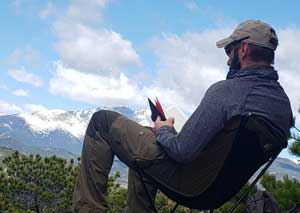 I am Detective Mike Lumbard with the Denver Police Department in Denver, Colorado. Like many police departments around the country, hostage negotiations or crisis negotiations, it’s an additional duty. You’re primarily a detective assigned to one specialty unit or another. And being a “Crisis Negotiator” is an extra duty that you volunteer for. For us, that means being on call for a two week period, wherein anytime there is any incident that meets the criteria or a Crisis Negotiator Team, the entire team gets activated and we meet and kind of plan our response and negotiate with whoever it is that’s in crisis or has an issue and we do our best to resolve the situation peacefully so that there is a minimization of any risk to loss of life or anything like that.
I am Detective Mike Lumbard with the Denver Police Department in Denver, Colorado. Like many police departments around the country, hostage negotiations or crisis negotiations, it’s an additional duty. You’re primarily a detective assigned to one specialty unit or another. And being a “Crisis Negotiator” is an extra duty that you volunteer for. For us, that means being on call for a two week period, wherein anytime there is any incident that meets the criteria or a Crisis Negotiator Team, the entire team gets activated and we meet and kind of plan our response and negotiate with whoever it is that’s in crisis or has an issue and we do our best to resolve the situation peacefully so that there is a minimization of any risk to loss of life or anything like that.
What would typically happen in a perfect world is you would receive a call-out and the entire team would meet at a command post and discuss the situation and our team leader would choose the person on the team that’s most appropriate to directly talk with that particular offender or person in crisis. Then, the rest of the team would set up including the roles of intel gatherer, a communication coach, a liaison. We would just start filling roles with the people that are most appropriate based on the situation.
In reality, whoever gets there first kind of starts to set that up on his or her own and quickly assesses the situation for what it’s going to need and what type of negotiation we’re going to have to do, whether it’s over cell phone, over loudspeaker, face to face, whether we have to use a throw phone to get up to the person who we’re negotiating with. That really determines how we move forward after that, is what kind of negotiation we’re going to have to do. And then the rest of the team, as they arrive, just sort of fills in the gaps for what’s needed until the entire situation sort of slows down enough that we can reorganize if we have to.
How Drugs and Alcohol affect Negotiations
Drugs and alcohol make a big difference because when we’re talking about negotiations, we’re talking about somebody who is in crisis. And when we’re talking about someone who’s in crisis, we’re talking about in crisis being in whatever way irrational and because, let’s face it, if you were rational, then being in that situation is not something you would rationally believe is a good idea. When we do that, the objective is always to bring someone who is irrational into a state of reason. Whenever drugs and alcohol are involved, it’s difficult because it adds something you can’t control. I can’t control how drunk a person is from the other end of the phone or how many drugs they’ve consumed or what have you. And then, unfortunately, drugs and alcohol are very influential in the sense that it happens a lot. It happens very, very often.
Negotiating with Veterans
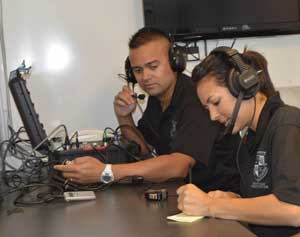
And with veterans, it’s very important because a lot of times we can talk about veteran community, you’re talking about people who have been indoctrinated with a certain viewpoint. They’ve been indoctrinated with a certain view of the world where certain things are right, certain things are wrong and if you match the wrong person to that, you create a mismatch that could set them off at any time. And that’s where matching somebody who’s been through some of the same traumas or same types of traumas and come out of it successfully on the other side is a benefit because there is a certain level of understanding there that allows the veteran Negotiator to touch on those values to say, “Hey, you and I are on the same side. We’ve seen the same blood and chewed the same mud. This is something we can get through together,” versus someone who has never been a veteran or never been in the military who is trying to do those things, trying to say those same values from an objective standpoint that just doesn’t feel as connected as someone who’s physically been there.
The other thing that would also be the most difficult is anything that’s face to face. The instant you are face to face, all of your supports are basically gone because you just can’t have that same level of support from a team when it’s just you and the other person standing face to face, talking about how they need to come back from the ledge or to put a gun down or something like that. It’s so much harder when you have to do all that thinking on the fly without that support of having a whole team and a bank of computers looking up information to help you.
Distressed Subject wearing possible Suicide Vest
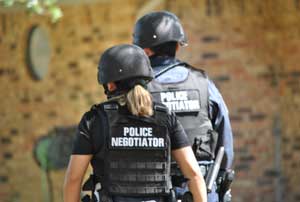
In addition to that, we’re trying to communicate with him over his cell phone, which he was calling 911 on. And anytime he would connect with 911, there would just be a bunch of screaming, some irrational statements, and then a hang up. We would never be on long enough to really establish communication that way. Also, because of the photos of his vest that he had created, we couldn’t just walk up to the door and negotiate with him through the door. So, we were really limited on the ways that we could communicate. In that particular sense, the first two negotiators on scene took turns trying to communicate with them over a bullhorn or a PA system from one of the police cars. Couple of hours of every type of empathetic statement we could think of just to try to get him to engage with us verbally in person, and just wasn’t working. The lead negotiator and the coach just kept switching back and forth in their roles over that period of time, just trying to get him to start talking.
What ended up happening was, as the two of us that were on the PA system just over and over and over keep trying to get him to start talking, eventually our command post arrived and we were able to back out and allow our tactical team to go and use the throw phone to get at least into a window. And our throw phones have cameras on them so we could see, once it was thrown inside, that the subject had already barricaded all the doors, all the windows. They had to kind of punch through that barricade on that window in order to get the throw phone inside. And once it was inside, the subject came up and grabbed it and was kind of running around the house, really just screaming nonsensically. And it was just really difficult to try to get his attention and try to get him to do anything that we were hopeful would allow us to create some sort of communication.
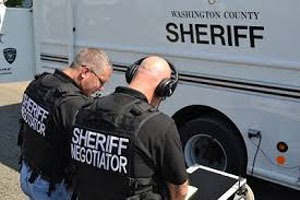
In the end, what we had to do was create basically a fake scenario where we were talking to him about what was going to happen. We were talking to him about anything that we could use to distract him, to think completely outside of defending himself and the tactical team had to end up cutting straight through the wall and entering the room where he was at, sideways through this wall to the exterior. It worked exceedingly well. He was distracted. He was confused. He had no idea what was happening. And in the end, this is one of those that you kind of wish that you had been able to talk him down or talk him into some sort of reasonable thought process. But you have to just recognize when you’re talking to someone who is not in touch with reality and when we did, we just sort of came up with a plan that would allow for the safest possible entry of our tactical guys and just hope that we were able to keep him distracted enough to let them get in there safely and take him into custody. And they did and it all ended well and nobody got hurt and we’re all thankful for that. And I would still consider that a win. Anytime we were able to get them out without anybody getting hurt.
Negotiations impacted by Subject on Social Media
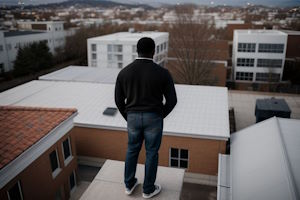
And he was angry about being fired from a job. And he was also very young, in his early 20s, and he didn’t have that kind of natural fear for his own life. And so, he was just reckless in the way that he acted and how quickly he bounced back and forth to thinking the whole thing was funny and then getting very serious and actually jumping over the ledge and hanging onto the rail for a moment, threatening to let go. And then that one was probably the most nerve wracking of my life just because I was within about 15 feet of him. Face to face, like I mentioned before is very, very difficult. And as we were doing that, trying to come up with things that he would latch onto and accept that his life had value. And every time something would happen in other places of the garage that were just noises or lights flickering or anything like that, he would get paranoid and start to climb over the rail again.
It became exceedingly difficult just to try to keep him focused. We talked for a couple of hours and every time his attention would change or his focus would change, I would move a couple of steps closer until eventually we got to a point where we were close enough that he was distracted. It had gotten dark. We cut the lights to that floor and he was kind of playing on a cell phone and we had been talking for quite a while just to kind of keep his focus away from jumping. And as we cut the lights off and were able to move a little bit closer, we took the opportunity for me to say a few words to him. Got his attention to change just enough for him to turn away from the railing. And then one of the street officers that were supporting us, hit him with a less lethal munition and we were able to just jump up real quick and snatch him off the ledge.
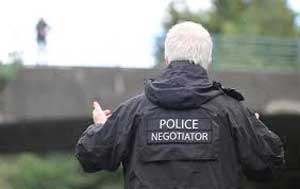
And it’s very, very difficult and it definitely makes the entire situation very nerve wracking. He was using social media, when I said he was playing on his phone. Social media began to play an issue because he was using it to cuss out and accuse past girlfriends, coworkers, things like that. And in that particular situation, there was nothing we could do to stop him from engaging in that kind of self satisfying behavior online because it’s the middle of the downtown area. There is so much free wifi down there that if we shut one thing down, he could just connect to something else and immediately be able to start posting again. The social media aspect made it hard because other people were able to influence him when I’m standing there trying to talk to him and that makes it very difficult to keep him focused. And it kind of allows people to either instigate and egg him on or to call him names or vice versa, for him to basically put himself at ease by saying his last piece to each one of those people. It definitely is a variable you don’t want to have to deal with if you don’t have to, in terms of social media.
How to get into Law Enforcement
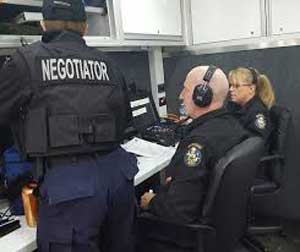
There are a lot of different law enforcement jobs and the requirements to be a police officer will vary. For some people, they get into law enforcement because they know they want to be a detective. And I applaud that. That’s great. Other people want to push a radiator around their town for their entire 30 or 40 year career. And that’s, again, admirable because both of them are serving their community in the way that appeals to them. In terms of advice, I would say, “Just understand and plan basically what is it that draws you to law enforcement? What is it that you want to do? What is it you want to accomplish?” So don’t just look for police jobs near me, think about your goals. There are a lot of different ways to be a peace officer, it is important to do what is a good fit for you.
And then with that plan, do everything you can to make it happen but also be flexible enough that when an opportunity presents itself, that you’re not afraid to say, “You know what? I think I ought to give this
a try.” Because there is a great wide world out there in law enforcement full of completely diverse set of possibilities that you could be doing anything from administrative and clerical work to tactical operations with a FBI SWAT team to crisis negotiations, to really putting the puzzle pieces together in a criminal investigator career. There is just no end to the possibilities. And so, it really is a great opportunity to just explore all of those and see what it is that really peaks your interest.
Related Articles:
• Detective Jobs
• What Law Enforcement Job is Right for Me?
• Police Hiring Process
• State Law Enforcement Agencies

 Joseph Libowsky,
Joseph Libowsky,